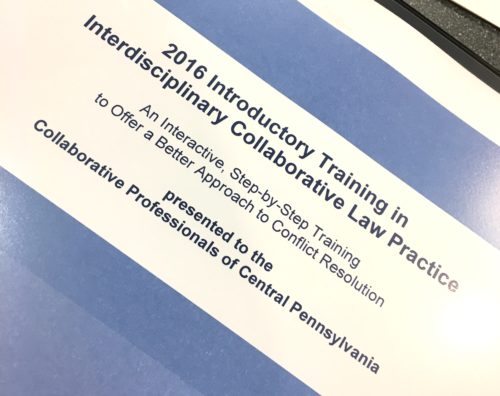 Earlier this month, I attended training for professionals looking to participate in the Collaborative Divorce Process. Collaborative teams typically consist of two attorneys (one to represent each party), a financial professional (neutral) and a coach (neutral). Since I’m a coach and an overall divorce enthusiast, I jumped at the opportunity to deepen my knowledge about this topic. I went, even though I’m not eligible to participate on a collaborative team. I’m not eligible, you see, because there’s a difference between a Divorce Coach (me) and a Coach in the collaborative process. Let’s investigate…
Earlier this month, I attended training for professionals looking to participate in the Collaborative Divorce Process. Collaborative teams typically consist of two attorneys (one to represent each party), a financial professional (neutral) and a coach (neutral). Since I’m a coach and an overall divorce enthusiast, I jumped at the opportunity to deepen my knowledge about this topic. I went, even though I’m not eligible to participate on a collaborative team. I’m not eligible, you see, because there’s a difference between a Divorce Coach (me) and a Coach in the collaborative process. Let’s investigate…
First, an analogy to illustrate the difference between a coach and a therapist: Let’s say you’re on a journey and you have a suitcase full of stuff. If you take the suitcase to a therapist, s/he will help you unpack the contents of your suitcase. Together, you’ll examine where you’ve been and the experiences you gained along the way. If, on the other hand, you take that same suitcase to a coach, the coach will simply help you move forward to your next destination. Therapy is a deeper process, while coaching is more directional.
Now, let’s talk about the different kinds of coaches…
A Divorce Coach works one-on-one with clients moving through a divorce process- any divorce process, be it litigation, mediation, collaboration or DIY. In this case, the coach is an ally. Someone who’s on your side. Someone who will help you examine where you are, discover where you want to go and determine the appropriate course to get there. The coach’s job is to provide enthusiasm, assist with strategies and hold his/her client accountable for the decisions they make and the actions they take.
So there you have it: an individual on a divorce journey might utilize the services of a therapist, a divorce coach and a collaborative law coach– each of them a different person, serving a different purpose. Isn’t it wonderful to know there are so many resources available to help ensure a productive divorce process? As always, I recommend anyone moving through the process be mindful when choosing and using divorce professionals. A brief consultation can help you learn more about the professional’s presence, strategies, commitment and cost.
*Special thanks to Gina Arons for providing specific verbiage pertaining to the coach’s role.
